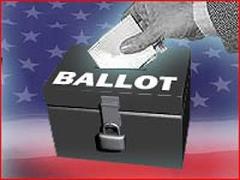Will November 7th. Be "Independents" Day? genre: Six Degrees of Speculation

While pundits, strategists, and journalists focus on the enthusiasm levels of the Democratic and Republican base, Stuart Rothenberg, in a new article, suggests that the midterm election may hinge on the independent voter turnout...and he concludes that they may well determine the size of the wave that is likely to put the Democratic Party in control of the House and possibly the Senate.
While all of us following this year's midterms are spending most of our time talking about the GOP's "base" problems and speculating about whether conservatives and evangelicals will stay home next month, we are missing a story that could turn out to be as big, or even bigger: independents.
Independents may not turn out at the same rate as strong partisans in midterm elections, but for dozens of Republicans trying to hold their seats in a potentially strong Democratic wave -- particularly those running in marginal districts -- independents will be plentiful enough at the polls to separate winners from losers. In Connecticut, for example, independents (unaffiliated voters) constitute a plurality of all state voters.
Normally, independents break roughly evenly between the two parties. In the 2000 presidential election, independents went for then-Texas Gov. Bush over Al Gore, 47 percent to 45 percent. Four years later, Sen. John Kerry (D-Mass.) bested Bush 49 percent to 48 percent among independents.
This year, that's not close to being the case. "There just aren't any independents this year," joked one Republican strategist I talked with recently. "There are Republicans, Democrats and soft Democrats."
During the last couple weeks, there has been ample discussion of the ability of the GOP to get out the vote. Many believe that the Republican Party's superior turnout machine and their feared 72 hour strategy has the potential to alter current polling numbers by a percentage point or two in favor of the GOP candidate. However, the fact that independents are leaning so heavily towards the Democratic Party suggests that they will easily offset any GOP advantage. Given the evidence that most voters believe that the country is going in the wrong direction and that Democrats are more enthusiastic than their Republican counterparts, any significant leaning on the part of independents seems likely to add to what many feel will be a wave election whereby conventional analysis is muted by a fundamental and widespread shift that is large enough to skew the outcomes of virtually every contest.
In poll after poll, independents are behaving like Democrats, whether it is in their distaste for Bush and the GOP-run Congress or in their vote choice in dozens of races around the country.
Nationally, a recent Cook Political Report/RT Strategies survey found a mere 33 percent of independents approving of the job Bush is doing. Those same independents favored Democrats, 49 percent to 30 percent, on the generic ballot. A Fox News/Opinion Dynamics poll found Democrats with a 9-point generic advantage among independents.
In a recent Mason-Dixon Polling & Research Inc. survey of Ohio's gubernatorial race, independent voters broke for Democrat Ted Strickland over Republican Ken Blackwell by an astonishing 22 points -- 51 percent to 29 percent.
A recent series of Los Angeles Times/Bloomberg surveys in Senate races found the same thing. In the Virginia Senate race, Jim Webb (D) held a 9-point advantage among independents over incumbent Sen. George Allen ®. In Ohio, Rep. Sherrod Brown (D), the challenger, held a 12-point lead over incumbent Sen. Mike DeWine ®. And in Tennessee, Rep. Harold Ford Jr. (D) held a 10-point lead over Republican Bob Corker among independents.
Simple math would suggest that if these numbers are substantiated on November 7th, the GOP get out the vote effort cannot overcome such a significant shift...especially if one looks back at the Republican Party's narrow victories in the 2000 and 2004 presidential elections where evidence suggests that the GOP had a superior voter turnout effort AND the narrow, but necessary support of independent voters. In my opinion, those historical numbers suggest that any minor shift in independent voter preferences coupled with a strong Democratic turnout would result in a significantly different outcome...one that would result in numerous losses for the GOP. In the end, it won't take much of a shift in voter sentiment to result in significant losses for the GOP. If the numbers are accurate, a big shift is inevitable.
Post a comment